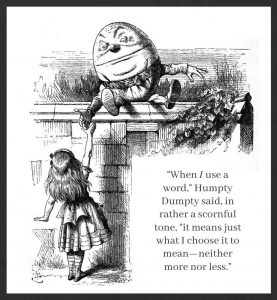[It wasn’t that many decades ago in the United States that] everyone would have been working [and thinking] on much the same presupposition, which in practice seemed to accord with the Christian’s own presuppositions. This was true both in the area of epistemology and methodology.…What were these presuppositions? The basic one was that there really are such things as absolutes.…Absolutes imply antithesis. The non-Christian went on romantically operating on this basis without a sufficient base for doing so. Thus it was still possible to discuss what was right and wrong, what was true and false. One could tell a non-Christian to ‘be a good girl’, and, while she might not have followed your advice, at least she would have understood what you were talking about. To say the same thing to a truly modern girl today would be to make a ‘nonsense’ statement. The blank look you might receive would not mean that your standards had been rejected but that your message was meaningless.
—Francis Schaeffer, in 1968—
Key points: We see the devastation caused by relativism all around us. Christians must understand that relativism is foundational quicksand, and they must help members of the next generation of believers see that absolutes are real and that respecting them has great benefits.
Access all the articles in this series, as well as articles in a related series, here. A Bible study titled “Could Jesus Have Been a Good Teacher Without Being God?” is available here.
Suppose you and your spouse and three kids are traveling home from a summer vacation, and it’s mid-morning. Your route will take you through a small town where Steve, a friend you both knew in college, lives with his family. It’s been years since you’ve seen him, and even though you’re just passing through, you hope you’ll be able to visit with him briefly. Maybe you’ll even get to meet his wife and kids.

Steve owns and runs the local hardware store in his town, so you give the store a call. He is excited to hear from you and suggests that the two families have lunch together at a place that “serves up the best barbecue in the state.” You agree to meet him at the hardware store in “about an hour.” Unfortunately, you’re one of the few families left in America who doesn’t have a GPS. Steve sends you a text with these instructions:
You’ll come into town on State Route 82. When you get to the edge of town, Route 82 becomes Main Street. You’ll see a convenience store with a gas station on your right, right across from Davidson’s Food Market. Keep traveling straight for a about three blocks. This area is our “downtown.” City Hall and the Police Station will be on the right, and the place where we’ll eat will be on the left. Go across the bridge, and continue going straight until you get to the next light, which is a couple more blocks away. The First Presbyterian Church is on the corner, right next to a car wash. Turn left onto Oakdale Avenue and travel about a mile. Then turn right at the light onto Poplar Street. The hardware store is a couple of blocks down on the left.

I’ve provided these instructions to fit this imaginary scenario, but let’s suppose it is real. You would be amazed—and totally frustrated—if State Route 82 became Cherry Street instead of Main, if there were no City Hall or Police Station in Steve’s “downtown,” if there were no bridge, if the local Public Library were located where Steve said you’d find the First Presbyterian Church, and if there were no Oakdale Avenue at all but instead, Elm Street. Was Steve lying to you? No, that isn’t where this illustration is headed; instead, it is meant to showcase what people’s experiences are like in a world where words do not have their ordinary, or commonly understood, meaning. We now are living in such a world. Please remember this statement. We will return to it shortly.
We are now living in a world where words do not have their ordinary, or commonly understood, meaning.

Do not misunderstand. At this point I’m not referring to Steves or Stephanies in your life, friends who might occasionally give you directions to their homes or places of business. You have every reason to believe that you and they are on the same wavelength as far as this kind of information is concerned. I am talking about society in general, however, the cultural mores and the societal consensus that prevail in the fabric of everyday life in your community and in America at large. Listen to none other than Humpty Dumpty, who, in Lewis Carroll’s classic children’s book, Through the Looking-Glass, illustrates this situation for us from a speaker’s perspective. “When I use a word,” Humpty Dumpty said, in rather a scornful tone, “it means just what I choose it to mean—neither more nor less.” Far too many Humpty Dumpties exist in places of influence in America today.
Newspeak and the Mainstream Media
In our last two posts — “Journalistic Malpractice, Parts 1 and 2” — we explored one facet of the problem of “newspeak,” a word that refers to the phenomenon we’ve been highlighting. That one facet is the newspeak in which reporters themselves engage. Specifically, members of the mainstream media have been and are claiming with straight faces that the protests that have occurred in the wake of George Floyd’s death have been “peaceful” or “mostly peaceful.”

To prop up this myth, reporters have had to ignore the truth in some instances (the focus of part 1) and lie in others (the main point of part 2.)
In part 2, we cited this commentary from Probe Ministries President Kerby Anderson. Take a couple of minutes and listen to Anderson’s entire presentation. Note carefully his last two sentences: “We live in a world where words like freedom, violence, and racism have been redefined. So be on the lookout for newspeak.”
We live in a world where words like freedom, violence, and racism have been redefined. So be on the lookout for newspeak.
—Kerby Anderson—
Words As Weapons
Recall the statement to which I said we would return: We are now living in a world where words do not have their ordinary, or commonly understood, meaning. Newspeak isn’t just a problem in the media. It’s a problem that has been and is seeping into the culture at large.
 Some cultural observers have noticed this for some time—but far too few. In 1990, Dr. James Dobson and Gary Bauer co-authored a book titled Children at Risk: The Battle for the Hearts and Minds of Our Kids. While many may not care for framing the divide in America in terms of battles or warfare, it was clear to Dobson and Bauer in 1990 that America was engaged in a “Second Great Civil War.” This is the theme of the second chapter. Dobson astutely observed,
Some cultural observers have noticed this for some time—but far too few. In 1990, Dr. James Dobson and Gary Bauer co-authored a book titled Children at Risk: The Battle for the Hearts and Minds of Our Kids. While many may not care for framing the divide in America in terms of battles or warfare, it was clear to Dobson and Bauer in 1990 that America was engaged in a “Second Great Civil War.” This is the theme of the second chapter. Dobson astutely observed,
Those who control what young people are taught and what they experience—what they see, hear, think, and believe—will determine the future course for the nation. Given that influence, the predominant value system of an entire culture can be overhauled in one generation, or certainly in two, by those with unlimited [or substantial] access to children.1
While all of the above statements are extremely important, the sentence Dr. Dobson wrote immediately prior to those I’ve cited above is even more so: “Children are the prize to the winners of the second great civil war.”2
Children are the prize to the winners of the second great civil war.
—Dr. James Dobson—
Chapter 13 of Children at Risk is titled “The Battle over Words.” In it, Gary Bauer says this:

In America’s cultural civil war, words are the builets used between the two sides, each contending for the hearts and minds of those Americans who have not yet made their choice of where to stand. Once again, however, the forces hostile to family, faith, and tradition seem to have the inside track. Controlling most of the major instruments of communication, they are able to manipulate words and their meanings over time, in order to advance the modernist agenda.3
Bauer then quotes from Law and Literature, a book by Richard A. Posner.
The adversary culture understands instinctively “…that language shapes thought, that choice of words can therefore have political and social consequences, that an impoverished vocabulary can impoverish thought.”
Bauer continues,
And that is exactly what has happened n America in recent years.4
Mr. Bauer goes on to observe that terms like virtue and chastity have become woefully outmoded. Speakers who dare to use them are sure to become targets of ridicule and derision. This despite the reality that these are perfectly good words describing desirable qualities, even traits that must be widely practiced if liberty is to be preserved.4 Bauer emphasizes this very point.
Jefferson said only a virtuous people can remain free.5 Today, in place of virtue we talk about values and, of course, we are constantly reminded that they are relative. Virtue doesn’t lend itself to relativism.6
A bit later in the chapter, Gary Bauer makes very important statements about 1) redefining words and 2) creating new ones. His insights need to be seared in the minds of everyone reading them, even thirty years later.
-
-
- “The redefinition of words to make it nearly impossible to define normal and abnormal has been going on for some time.”7 Reflect on how society’s thinking about homosexuality has changed nearly 180 degrees, and in less than a lifetime!
- In addition, new words are created that become “new weapons to be used in the civil war. If homosexuality is not considered abnormal, something else called homophobia is. Homophobia is an abnormal fear of and revulsion to homosexuality. The word is routinely leveled at anyone who opposes the gay rights agenda.”8
-
Newspeak Here, Newspeak There, Newspeak, Newspeak Everywhere!
The radical efforts Dr. Dobson and Gary Bauer exposed in Children at Risk have only intensified in the intervening years. Consider that the Merriam-Webster Dictionary currently defines racism as “a belief that race is the primary determinant of human traits and capacities and that racial differences produce an inherent superiority of a particular race.”

To Drake University graduate Kennedy Mitchum, that definition was inadequate, and she corresponded by email with those responsible for changes in the dictionary. Writing for the Patriot Post Douglas Andrews highlights Ms. Mitchum’s contention that the current definition was too “simple.” She further said, “I know what racism is.” Kennedy brought her case to those in charge at Merriam-Webster, who dutifully complied with what she said needed to happen. Here’s how Andrews puts it.
Clearly shaken by the sheer force of Mitchum’s argument, Merriam-Webster thanked her for her “persistence” and then fell into line. “While our focus will always be on faithfully reflecting the real-world usage of a word, not on promoting any particular viewpoint,” said Editor Alex Chambers, “we have concluded that omitting any mention of the systemic aspects of racism promotes a certain viewpoint in itself.”
Thus, they’re adding a dubious “systemic” aspect to their definition of racism, but they’re not “promoting any particular viewpoint.”

Need we mention that the planned redefinition of the term racism completely ignores the real progress Americans have made in race relations in recent decades? Yes, racism has existed in America’s past, but generally speaking, America is not a racist country today. Here’s another fact “conveniently” overlooked. A great many racist policies were promoted and upheld by Democrats. Despite their resistance, slavery was abolished long ago, lynchings no longer are practiced, and Jim Crow laws have been overturned.
Yet, despite all these things, the prevailing narrative declares whites guilty for sins of the distant past and contends that blacks are victims of “systemic” oppression. Soon, even the dictionary will indicate this—or at least it will tilt strongly in this direction.
Words Can Do Untold Damage
Despite all the progress made in race relations in this country, no one will believe any improvements have occurred if everyone hears the leftist narrative from sunup to sundown, every day of the week. Folks, this is exactly what is happening! We are living in George Orwell’s 1984. Joseph Goebbels, Germany’s Minister of Propaganda from 1933-1945, said this: “If you repeat a lie often enough, people will believe it, and you will even come to believe it yourself.”
Newspeak and the lies it promotes constitute ethical and moral quicksand that can be avoided only when one appreciates and respects absolute truth. Thus, to avoid great peril ourselves, and to help our children avoid it, we as Christians must model and pass along to younger believers a deep appreciation and respect for absolutes. I am not talking about legalism here. What I am speaking of is part of contending “earnestly for the faith which was once for all delivered to the saints” (Jude 3).
If you repeat a lie often enough, people will believe it, and you will even come to believe it yourself.
—Joseph Goebbels—
None of the crazy scenarios occurring is unfolding in isolation. In the world in which we live, Billy Graham is considered a homophobe. Yes, he did oppose the militant homosexual agenda, and he supported man-woman marriage. He had good, solid reasons, and not hateful ones, for holding these convictions. It isn’t Scripture alone that affirms marriage as we’ve known it for centuries (even though Scripture is enough), but nature itself. Billy Graham declared and demonstrated God’s love, and in doing so, he affirmed that real love doesn’t approve of wrong behavior or harmful ideas. It seeks to help people avoid them.
Consider this as well. In our world, professors of higher education are contending that math “reeks of white supremacist patriarchy” and that “mathematics itself operates as whiteness.”
Further, in response to supposed police brutality and racism among law enforcement officers (assumptions not supported by the evidence), “At Least 12 Cities Are Defunding Their Police Departments.” This is bizarre. This response defies all clear-thinking logic. Crime will rise even before police departments actually are defunded; the mere talk of defunding law enforcement, and the fact that people are seriously considering doing it, are enough to put criminal activity on steroids. Karol Markowicz, columnist for the New York Post, told Tucker Carlson,
The crime spike is really not a surprise for anybody that’s been following it.…I think we’ve let the leftist activists and politicians divide us into the camps of, either you are pro-police or you believe black lives matter. But the truth is, if you are pro-police, it’s because you believe black lives matter. And if you look at the recent crime spike, it’s happening primarily in black neighborhoods. And that’s why these white activists are pushing this defund police idea—because it’s not happening in their neighborhoods. If it was, they’d want triple the police on their streets (emphases added).
Don’t you see the perilous place where carefully chosen words, used as bullets by leftists in the culture war, are putting Americans? It has never been more important in this country to uphold absolute truth and to contend for it than it is today. As a first step, this means having discernment so one isn’t duped by the prevailing messages that entice and mislead so many.
The Real Target Is God’s Law
While some of the people buying into the leftist narrative may have good intentions, many do not—and they know exactly what they’re doing. The goal is to divide, divide, divide! Liberty cannot long survive among a people divided by this kind of rhetoric.
I began this post with an illustration about a friend of yours, Steve, who gave you directions to his hardware store. Christians must realize that the real target of leftist radicals is God’s law, the directions He has given us about how to live fulfilled lives.
The real target of leftists is absolute truth.
In other words, the real target is absolute truth. Leftist radicals want to confuse people about what God has said because they want to destroy the liberty that is fostered when God’s law is the basis for morality and ethics in a nation. Without God’s law, liberty is not possible.
I have more to say about all of this, but for now, we’ll need to declare a time out.
Stay tuned! Our journey next time will lead us to additional nuggets of truth all of us will need in the weeks and months ahead.
Copyright © 2020 by B. Nathaniel Sullivan. All rights reserved.
top image credit: Lightstock
Unless otherwise indicated, Scripture has been taken from the New King James Version®. Copyright © 1982 by Thomas Nelson, Inc. Used by permission. All rights reserved.
Notes:
1Dr. James Dobson and Gary Bauer, Children at Risk: The Battle for the Hearts and Minds of Our Kids, (Dallas: Word Publishing, 1990), 35. (Dr. Dobson is the author of the chapter from which this quote is taken.)
2Ibid.
3Dobson and Bauer, 218. (Gary Bauer is the author of the chapter from which this quote is taken.)
4Dobson and Bauer, 219. (Bauer is the author in this instance.)
5Jefferson made these statements, among others: 1) “Dependence begets subservience and venality, suffocates the germ of virtue, and prepares fit tools for the designs of ambition.” 2) “Liberty . . . is the great parent of science and of virtue; and . . . a nation will be great in both always in proportion as it is free.” 3) “The order of nature [is] that individual happiness shall be inseparable from the practice of virtue.” 4) “Without virtue, happiness cannot be.” See this compilation of quotes.
6Dobson and Bauer, 219. (Bauer is the author in this instance.)
7Dobson and Bauer, 222.. (Bauer is the author in this instance.)
8Ibid.


Be First to Comment